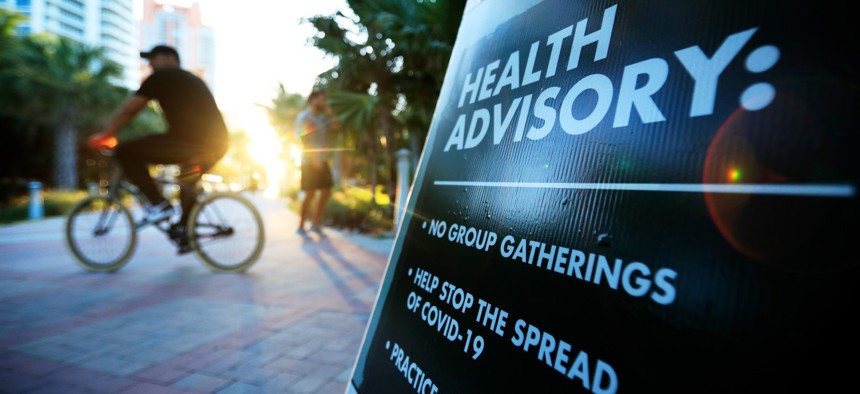
A cyclist passes a “Health Advisory” sign on March 18, 2020, in Miami Beach, Florida, during the early days of the COVID-19 pandemic. Cliff Hawkins / Getty Images
Preparation for pandemics and natural disasters updated in bill passed by Senate panel
Legislation would increase accountability, transparency in how federal government helps state, local governments prepare for and respond to public health emergencies.
A U.S. Senate committee approved legislation Thursday that would update how the federal government prepares for and then responds to pandemics and natural disasters.
The broadly bipartisan legislation moved through the Senate Health, Education, Labor and Pensions Committee following a 17-3 vote after members adopted two bipartisan amendments.
Republican Sens. Rand Paul of Kentucky, Mike Braun of Indiana and Tommy Tuberville of Alabama voted against moving the bill to the Senate floor. Oklahoma GOP Sen. Markwayne Mullin voted present.
Louisiana Sen. Bill Cassidy, the top Republican on the committee, said the COVID-19 pandemic showed Congress that the existing Pandemic and All Hazards Preparedness Act was “far from perfect.”
Congress originally established the law in 2006, following the federal government’s “failures” in responding to Hurricane Katrina in Louisiana, Cassidy said.
“Although mistakes were made during COVID-19, we did learn some tough lessons and we hope this legislation is here to make sure that future generations are not forced to learn on the fly should another crisis occur,” Cassidy said.
“We’re updating the playbook, and we’re ensuring that our framework remains flexible to address those future threats — a future Hurricane Katrina for example,” he added.
The legislation, Cassidy said, would increase accountability and transparency in how the federal government helps state and local governments prepare for and respond to public health emergencies.
COVID pandemic showed the U.S. was ‘tragically unprepared’ for crisis
Vermont Sen. Bernie Sanders, the committee’s chair, said during the hearing the bill would help the federal government better prepare for future pandemics and natural disasters as well as possible biological, chemical or nuclear threats.
“I think it is fair to say that while all of our public health people worked tirelessly and did everything they could to protect the American people, it would be an understatement to say we were tragically unprepared to respond to that crisis,” Sanders said.
The 107-page bill has several sections, including a reauthorization of the Hospital Preparedness Program, an update of the National Health Security Strategy and updates to the Annual Threat-Based Review for the Strategic National Stockpile, according to a summary.
The bill, Sanders said, would require companies to tell the U.S. Food and Drug Administration if there’s a spike in demand for any of their products that they are unable to meet, like a shortage of children’s Tylenol.
The measure would also expand emergency medical services in rural areas, Sanders said.
The bill is co-sponsored in the Senate by Pennsylvania Democrat Bob Casey, Utah Republican Mitt Romney, Sanders and Cassidy.
Strengthening the Strategic National Stockpile
The HELP Committee adopted two amendments to the bill, one from North Carolina Republican Sen. Ted Budd and New Hampshire Democrat Maggie Hassan as well as a second amendment from Colorado Democratic Sen. John Hickenlooper and Budd.
The Budd-Hassan amendment would strengthen the Strategic National Stockpile, which purchases and stores personal protective equipment, vaccines and pharmaceuticals, among other critical supplies. The amendment implements some recommendations made by the Government Accountability Office.
The Hickenlooper-Budd amendment would establish an emerging pathogen preparedness program at the FDA that would allow the agency to respond faster during a future pandemic.
“This new team will allow FDA to dedicate the necessary manpower to be able to quickly evaluate and … clear the many countermeasures that would come before them during a pandemic,” Hickenlooper said. “Getting these countermeasures to the public fast in a time of crisis will save lives.”
The FDA had requested the authority from Congress, he said.
Cassidy spoke out against the amendment, saying he was unsure why the FDA would need Congress to establish a new program for emerging threats since it already has “an office of counterterrorism and emerging threats.”
Tuberville amendment on CDC directors was rejected
The HELP Committee also rejected several amendments.
A majority of the panel did not agree to add a proposal from Tuberville that would have required any new Centers for Disease Control and Prevention directors nominated by the president to get Senate approval immediately, moving up the timetable from January 2025.
Braun and Budd had an amendment rejected that would have prevented the secretary of the Health and Human Services Department from declaring a public health emergency on gun violence.
The panel rejected several amendments from Paul, including one that would have divided the National Institute of Allergy and Infectious Diseases within the National Institutes of Health up into three different agencies.
Paul unsuccessfully proposed another amendment that would have barred federal funding from going to gain of function research in China.
Paul defined that as “any research project that may be reasonably anticipated to confer attributes to influenza, MERS, or SARS viruses such that the virus would have enhanced pathogenicity or transmissibility in mammals.”
Sanders said Paul’s concerns about that type of research are important and pledged to work with the Kentucky Republican on the issue moving forward, though he said the bill itself gets at the issue.
“I worked with ranking member Cassidy to include a provision in this bill to make sure that any country, including China, that is deemed dangerous by our intelligence community would not be able to receive medical research dollars from the U.S. government for a minimum of five years,” Sanders said.
Paul’s amendment on gain of function research, Sanders said, could have jeopardized international collaborations on medical research.
Idaho Capital Sun is part of States Newsroom, a network of news bureaus supported by grants and a coalition of donors as a 501c(3) public charity. Idaho Capital Sun maintains editorial independence. Contact Editor Christina Lords for questions: info@idahocapitalsun.com. Follow Idaho Capital Sun on Facebook and Twitter.






